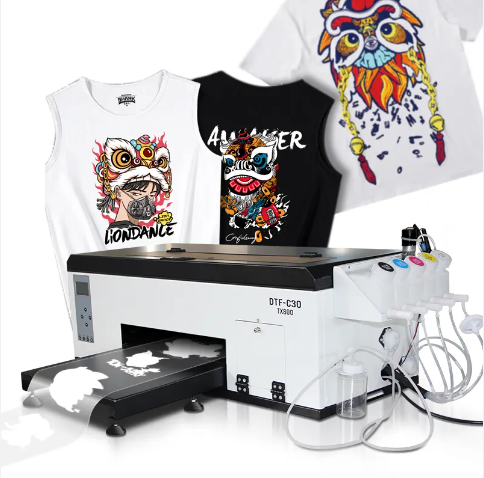

DTF (Direct-to-Film) Printing Technology – A Breakthrough Solution
The DTF printing process, featuring a white ink heat transfer printer, film substrate known as print film, and the corresponding ink, represents a significant innovation within the textile printing industry. DTF is compatible with a broad spectrum of garment materials, such as cotton, polyester, nylon, treated leather, polyester blends, and mixed-fiber textiles. Notably, this method also extends its reach to diverse surfaces like bags, shoes, glass, wood, and metal, making it a game-changer in the realm of heat transfer printing through its ability to apply custom designs across a myriad of products.

Film Compatibility & Print Quality:
DTF Film Compatibility and Exceptional Print Performance
The DTF film is designed to work seamlessly with most inks available on the market, allowing for full 100% ink coverage without issues of coagulation or spreading. Once transferred, the images display a PU-gel-like finish that boasts outstanding elasticity and shape retention without distortion, providing a softer feel than conventional plastisol prints. The film surface dries to a smooth touch and facilitates easy peeling at different temperatures—hot, warm, or even cold. The use of DTF’s release film ensures a quick and clean peel-off effect.
DTF Ink Characteristics and Usage:
DTF Ink Selection and Printing Capabilities
The DTF ink set for white ink heat transfer printing consists of five color categories: Black (K), Cyan (C), Magenta (M), Yellow (Y), and White (W). These inks are adaptable to various printer printheads, including EPSON DX5, DX7, 5113, 4720, XP600, and i3200 models. They deliver vivid hues with high ink density and achieve a water-resistance rating up to level 4. The white ink from DTF offers exceptional whiteness and opacity, effectively covering the base material without clogging printheads. To ensure optimal performance, users should shake the white ink well before use and consider integrating a mixing device to prevent sedimentation during periods of non-operation.
DTF Printing Process and Advantages:
DTF Heat Transfer Printing Process: A Simplified and Cost-Effective Method
The DTF white ink heat transfer process entails printing colorful and opaque white inks onto a transfer film, coupled with a supplementary powder-coating step, thereby enabling the production of heat transfer prints on textiles. This simplified technique does away with the need for intricate masking or weeding, and necessitates basic equipment, which includes a dedicated heat transfer printer, a powder applicator, and a heat press machine. As a complete package, this solution boasts a low barrier to entry, provides flexibility in inventory management, minimizes costs, and stands out as a preferred option for investors seeking substantial returns on a modest investment.